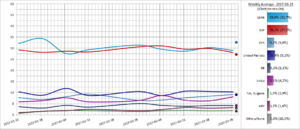2017 Bulgarian parliamentary election facts for kids
The 2017 Bulgarian parliamentary elections were a big event in Bulgaria on March 26, 2017. These elections were held earlier than planned because the political groups couldn't agree on how to form a government. This meant people had to vote again sooner than expected.
Before the elections, Boyko Borisov stepped down from his job as prime minister after the Bulgarian presidential election, 2016. To win seats in the parliament, a political group needed to get at least 4% of all the votes.
The GERB party, which supports the European Union, won the most seats. The Bulgarian Socialist Party also gained many more seats. However, the Reformist Bloc lost all 23 of their seats.
Contents
What People Thought Before the Election
Before the election, people often shared their opinions about which political groups they supported. These are called "opinion polls." The picture below shows how these opinions changed over time in 2017. The dots at the end of the graph show the final results of the election.
Election Results: Who Won?
In the 2017 elections, many different political groups took part. Here's a simple look at how many votes and seats the main groups won:
| Choice | Votes | % | Seats Won | Change in Seats |
|---|---|---|---|---|
| GERB | 1,147,283 | 32.65% | 95 | |
| Bulgarian Socialist Party | 955,490 | 27.20% | 80 | |
| United Patriots | 318,513 | 9.07% | 27 | |
| Movement for Rights and Freedoms | 315,976 | 8.99% | 26 | |
| Volya | 145,637 | 4.15% | 12 | |
| Other groups | 542,705 | 15.45% | 0 | – |
| None of the above | 87,854 | 2.50% | 0 | – |
| Total votes | 3,513,458 | 100% | 240 | – |
What Happened Next
After the election results were announced, it was expected that Boyko Borisov would become the prime minister of Bulgaria again.
See also
 In Spanish: Elecciones legislativas de Bulgaria de 2017 para niños
In Spanish: Elecciones legislativas de Bulgaria de 2017 para niños
 | James B. Knighten |
 | Azellia White |
 | Willa Brown |


